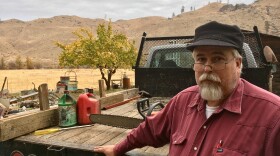Ashley Ahearn
-
Across the West, women are changing the ways land and livestock are managed.
-
Across the West, women are changing the ways land and livestock are managed. Ashley Ahearn saddled up for the Mountain West News Bureau to chronicle their big dreams – and daily challenges. This is the second story of a three-part series.
-
Across the West, women are changing the ways land and livestock are managed. Ashley Ahearn saddled up for the Mountain West News Bureau to chronicle their big dreams – and daily challenges. This is the first story of a three-part series.
-
In the past two years, more than 800,000 acres in northern Nevada have burned. The traditional sagebrush rangeland is being replaced by cheatgrass that burns hotter and more frequently.
-
A proposed fee of $15 per ton of carbon emissions in Washington state has several exemptions for large emitters, and has rural voters afraid they'll end up paying.
-
As international leaders convene in Paris to talk about solutions for climate change, one tribe on the Washington coast reluctantly plans its retreat from the encroaching Pacific Ocean.
-
Over 1,600 acres of old-growth rainforest have burned in Washington's Olympic National Park. As Ashley Ahearn of KUOW reports, the wildfire is expected to persist through the rest of the summer.
-
The Forest Service is set to open more than 80,000 acres for clean, renewable geothermal power in Washington state. But environmentalists are worried about damage to streams and old-growth forests.
-
Snow levels are at record lows for Washington and Oregon. That could create problems later on in the dry season when there's no more snow to feed rivers that depend on snowmelt.
-
The Port of Seattle has leased space to Shell Oil to dock ships and store Arctic drilling rigs in the off season. City officials and environmentalists question that decision and want Shell out.
-
Once a booming timber area, Grays Harbor County is the site of three proposed oil terminals. The local fishing industry sees the uptick in oil movement as a big risk, with limited economic benefits.
-
Washington state is home to more glaciers than any other state in the lower 48. And they're receding faster than ever before.






